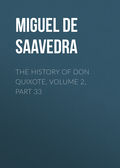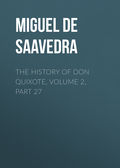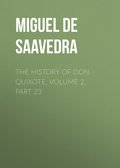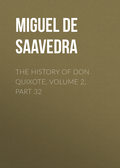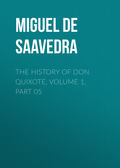
Мигель де Сервантес Сааведра
The History of Don Quixote, Volume 2, Part 38
"I do not seek to know more," said the gentleman, "for this is enough to convince me, O Head, that thou knowest everything;" and as he retired the other friend came forward and asked it, "Tell me, Head, what are the wishes of my eldest son?"
"I have said already," was the answer, "that I cannot judge of wishes; however, I can tell thee the wish of thy son is to bury thee."
"That's 'what I see with my eyes I point out with my finger,'" said the gentleman, "so I ask no more."
Don Antonio's wife came up and said, "I know not what to ask thee, Head; I would only seek to know of thee if I shall have many years of enjoyment of my good husband;" and the answer she received was, "Thou shalt, for his vigour and his temperate habits promise many years of life, which by their intemperance others so often cut short."
Then Don Quixote came forward and said, "Tell me, thou that answerest, was that which I describe as having happened to me in the cave of Montesinos the truth or a dream? Will Sancho's whipping be accomplished without fail? Will the disenchantment of Dulcinea be brought about?"
"As to the question of the cave," was the reply, "there is much to be said; there is something of both in it. Sancho's whipping will proceed leisurely. The disenchantment of Dulcinea will attain its due consummation."
"I seek to know no more," said Don Quixote; "let me but see Dulcinea disenchanted, and I will consider that all the good fortune I could wish for has come upon me all at once."
The last questioner was Sancho, and his questions were, "Head, shall I by any chance have another government? Shall I ever escape from the hard life of a squire? Shall I get back to see my wife and children?" To which the answer came, "Thou shalt govern in thy house; and if thou returnest to it thou shalt see thy wife and children; and on ceasing to serve thou shalt cease to be a squire."
"Good, by God!" said Sancho Panza; "I could have told myself that; the prophet Perogrullo could have said no more."
"What answer wouldst thou have, beast?" said Don Quixote; "is it not enough that the replies this head has given suit the questions put to it?"
"Yes, it is enough," said Sancho; "but I should have liked it to have made itself plainer and told me more."
The questions and answers came to an end here, but not the wonder with which all were filled, except Don Antonio's two friends who were in the secret. This Cide Hamete Benengeli thought fit to reveal at once, not to keep the world in suspense, fancying that the head had some strange magical mystery in it. He says, therefore, that on the model of another head, the work of an image maker, which he had seen at Madrid, Don Antonio made this one at home for his own amusement and to astonish ignorant people; and its mechanism was as follows. The table was of wood painted and varnished to imitate jasper, and the pedestal on which it stood was of the same material, with four eagles' claws projecting from it to support the weight more steadily. The head, which resembled a bust or figure of a Roman emperor, and was coloured like bronze, was hollow throughout, as was the table, into which it was fitted so exactly that no trace of the joining was visible. The pedestal of the table was also hollow and communicated with the throat and neck of the head, and the whole was in communication with another room underneath the chamber in which the head stood. Through the entire cavity in the pedestal, table, throat and neck of the bust or figure, there passed a tube of tin carefully adjusted and concealed from sight. In the room below corresponding to the one above was placed the person who was to answer, with his mouth to the tube, and the voice, as in an ear-trumpet, passed from above downwards, and from below upwards, the words coming clearly and distinctly; it was impossible, thus, to detect the trick. A nephew of Don Antonio's, a smart sharp-witted student, was the answerer, and as he had been told beforehand by his uncle who the persons were that would come with him that day into the chamber where the head was, it was an easy matter for him to answer the first question at once and correctly; the others he answered by guess-work, and, being clever, cleverly. Cide Hamete adds that this marvellous contrivance stood for some ten or twelve days; but that, as it became noised abroad through the city that he had in his house an enchanted head that answered all who asked questions of it, Don Antonio, fearing it might come to the ears of the watchful sentinels of our faith, explained the matter to the inquisitors, who commanded him to break it up and have done with it, lest the ignorant vulgar should be scandalised. By Don Quixote, however, and by Sancho the head was still held to be an enchanted one, and capable of answering questions, though more to Don Quixote's satisfaction than Sancho's.



